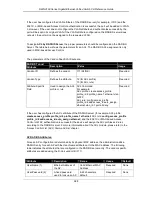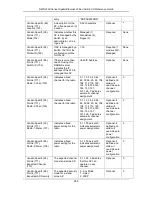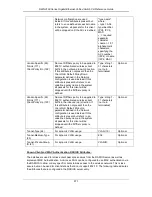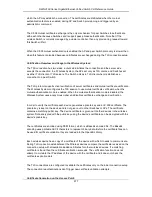
DWS-3160 Series Gigabit Ethernet Unified Switch CLI Reference Guide
978
The AP auto-generates an X.509 certificate when it boots. At boot time the AP checks whether the
key file and the certificate file already exists. If the files exist then the AP uses them, otherwise the
AP generates the files. The /etc/uwskey.pem file contains the 1024 bit private key. The
/etc/uwscert.pem file contains the X.509 certificate.
In order to regenerate the AP certificates the administrator may issue a "factory-reset" command
on the AP or delete the two files from the file system and reboot the AP.
Certificate Generation on the Switch:
The Switch auto-generates an X.509 certificate and other key files when it boots. At boot time the
Switch checks whether the certificate and key files exist, and if they don't then the Switch
generates the files.
The administrator can re-generate the X.509 certificates used by the Wireless component. Note
that Diffie-Hellman keys are not regenerated. The wireless feature should be disabled while the
keys are being regenerated. If mutual authentication is enabled then the Switch must be re-
provisioned before it can join the cluster.
The Wireless Switches are assigned IP addresses by the administrator. The routing package is
included into the product and the routing is enabled by default. Besides the existing System
interface, the administrator may create a routing interface optionally. The wireless software
automatically selects the IP Address of the lowest interface index. The System interface is always
the interface with the lowest index “1”. If the System interface is deleted then the software
automatically selects the IP address of a lowest index routing interface. If no interfaces are defined
then the wireless function is disabled.
IP Address Assignment
Disabling the interface or changing the IP address of the interface disables the wireless function. If
another interface exists then the wireless function starts using it automatically.
Once an interface is selected the wireless function continues to use that interface until the
interface goes down.
Changing the IP address of the network interface automatically disables and re-enables the
wireless function.
The administrator has the option to disable automatic IP address assignment for the Wireless
function and enter a static IPv4 address. The IP address must be the same as an address of an
active routing interface in order for the Wireless function to work. If the interface with the specified
address doesn’t exist or is not active then the Wireless function is disabled and the WLAN Switch
Disable Reason is set to “No Active Interface for Statically Configured IP Address”.
If the static IP address is configured when the Wireless feature is already enabled then if the
configured static IP address is different from the current IP address used by the Wireless feature
then the Wireless feature is automatically disabled and re-enabled with the new IP address. If the


































